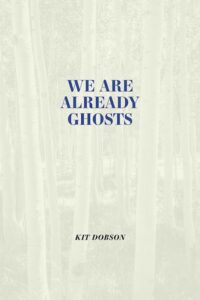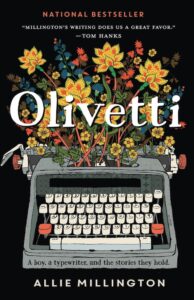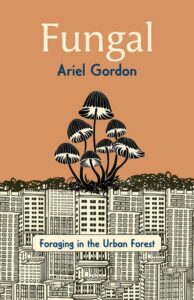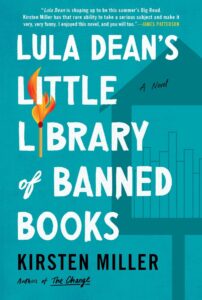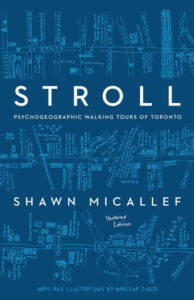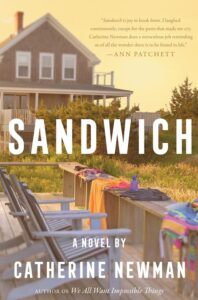July 24, 2024
Summer Reading

Earlier this month I wrote a substack post (available to all readers) about Catherine Newman’s SANDWICH as an ideal beach read. You can read it here!
Paid subscribers can read my July essay, “How to Build a Summer Reading List,” which went up yesterday, and you can read it here. (Thank you to new subscribers! It means everything.)
And finally, there’s a Canadian Goodreads giveaway of my novel ASKING FOR A FRIEND, which makes for an ideal summer read, I must say. Enter before July 29 for your chance to win!
July 23, 2024
We Are Already Ghosts, by Kit Dobson
Imagine—structurally speaking—To The Lighthouse a century later, Woolf’s modernist masterpiece transposed from Cornwall to rural Alberta, the story of a family cabin, a summer idyll, one precious week a year in which time appears to stand still and nothing ever changes. Except, of course, the children are growing, and parents get older, marriages end and new loves begin, and babies are born, and people die, and all of this flurry of action—in Kit Dobson’s cerebral and tremendously moving first novel WE ARE ALREADY GHOSTS—takes place in the “corridors” between the narrative’s main sections, each corridor spanning a five year gap that brings us back again to the cabin that once belonged to Clare’s parents, where now she comes with her own family and those of her husband’s brothers. The novel begins in 1996 and returns us—at five year intervals—to the family at this place so removed from the world, and yet part of it enough that the world creeps in, and I’m thinking about the attraction of summer places like these, the places we return to, the illusion that anything can ever stay the same, or that any of us might outwit the human condition of being mortal, and how the reality of the matter can shock us every time. GHOSTS is an enveloping story of love and family, of parenthood, and also time, and CanLit tropes, and war, and history, and bears at the dump, and what it means to live on stolen land, and everything that’s eternal, and everything that isn’t, and I loved it all so much.
July 18, 2024
Olivetti, by Allie Millington
“Who uses typewriters anyway?” so once posed The Bard, though it is a different kind of antique typewriter nostalgia that drew me to Allie Millington’s middle grade novel, Olivetti—I bought it for my daughter, who loved it and implored me to read it too. And let me tell you, there was no such thing as antique typewriter nostalgia during my childhood, when my dad worked for Olivetti and sold typewriters all over southern Ontario. Nobody, including me, realized just how hipster cool that was, and we had antique typewriters all over the house, and I have such visceral memories of their tactility, the feel of the keys, how the key arms would get all gummed up, the smoothness of the roller, how strange it was to see the alphabet disordered, the freedom of unrolling a ribbon, the spool leftover with a hole just perfect for sticking my finger, the mess of ink. I don’t think it’s such a leap that the daughter of an Olivetti salesman becomes a writer, born with the tools of the trade at her disposal—but when I was little “Olivetti” was just my dad’s work, a name to which my friends responded with blank faces when I told them what he did, and so it’s strange now to realize it has resonance, that Olivetti has meant something to an awful lot of people.
In Millington’s novel, Olivetti is a sentient typewriter who (as keeper of the stories) holds the key to the mystery when Beatrice Brindle goes missing. Her troubled youngest son Ernest is the one who has to figure out where his mother has gone, aided by the savvy daughter of a pawn shop owner whom Beatrice has sold Olivetti to before she fled to who-knows-where. This is a novel about heavy stuff—the family has finally come through Beatrice’s cancer treatment, and they’re still not over the stress and anxiety, and all our expectations about narrative and how a life proceeds suggest that everything should be happy and easy now, but it isn’t because life is not a book (even within this book), all tidy endings.
Millington strikes a careful balance between comfort and reality—my kid who still finds sad stories upsetting thought this story (which ends on an uplifting note) was really compelling. I really loved it too, and was so happy that she shared it with me.
July 17, 2024
Gleanings
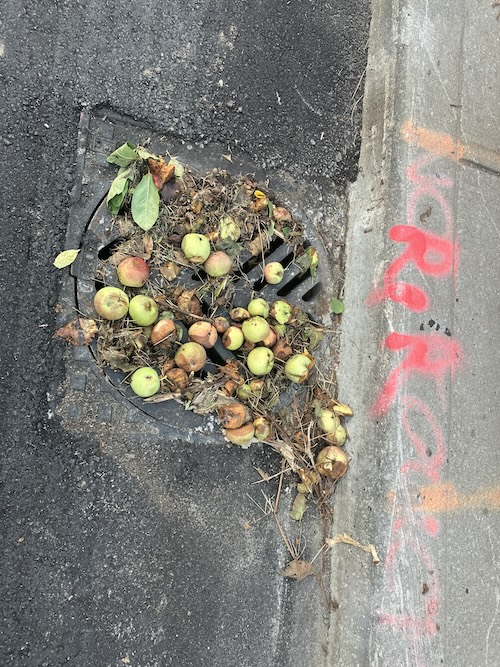
- Because parenting when everything is terrible IS THE REASON FOR THE MOTHERFUCKING SEASON. Because breaking the news that life is painful and beautiful and will break your fucking heart so we have to love each other as fiercely as possible while we canis the most important thing a parent can teach, model and personify for their child. I say this because it is perhaps the only thing I know to be true.
- I had heard A Month in the Country referred to so often, with such admiration, that I avoided it, rather cynically, for years, doubting it could live up to the hype. Now I wish I hadn’t.
- All to say, be weird, be exact, make your masterpieces, create good energy, inspire, uplift, conduct your magical weird operations, you know? Because maybe that is doing one other person some good in this world.
- Sometimes you think you’ve lost something and then you realize you still have it in another form. Another shape. A warm grassy slope, trees laden with fruit, wild violets and strawberries scattered in the grass like a medieval embroidery: gone. But what you have now is a close and domestic beauty, smaller, still with its own sweet promise.
- If I’m ever feeling stuck, either in my writing or in life, I just need to go for a walk; to feel the sunshine on my skin, to see the world in the light. I always come back from those walks with an answer.
- Opinions are not bad things to have, they make for interesting conversation, as long as one is open to discussion. But, do we need to have one on every single thing? Is it so out of vogue in today’s world to say: I don’t know enough about that to have a strong opinion on it? To admit that we lack the knowledge and facts to make an intelligent statement or comment?
- By which I mean I would so love for them to sit and watch raindrops.
- By 2019, I felt like a real camper! I, Margaret Lawrence Wizenberg, know how to camp. Every time we load up, I wish we had less gear, and every time we unload at the end of a trip, it was exactly the right amount.
- Our Carolinian Forest is just such a cathedral, only much more hallowed and sacrosanct. After being housebound for a full week, standing in the shelter and comfort of this forest luxuriance, I felt my mind slow and my heart expand, knowing I crave no other architrave.
- It’s reckoning with the possibility that all of our lives, no matter how long or how deep, how wise or purposeful, how clean or messy, big or small, how much we do or get right, say or don’t say, will always be perfectly unfinished, completely incomplete.
- As with any meaningful recovery, it took time for the orange tree to heal from the trauma of being moved outside –– to a weekend of thunderstorms and scorching sun –– with no warning. Acid yellow leaves turned a verdant green, and within six months, half a dozen plump oranges sprang from its robust branches.
- But in 2024, with abortion bans and trad wives and men’s rights activists and the racial disparity in maternal mortality rates and oh, did you hear it’s trendy to be skinny again? it is absolutely jarring to hear Perry telling us that it’s a woman’s world and we’re lucky to be living in it. Is it? And are we?
- When my children were very young, I was prone to joining cults. I use the word “cults” loosely, and what I mean is that I was very vulnerable to answers to the only question I was asking: how is one supposed to live?
- “With a growing family, we need a bigger house.” Can’t tell you how many times I hear this from mid-career professionals, occupying renovated three + bedroom houses in my suburban community of Weston.
- I’m pleased to report it’s raining. It started last night and it’s still going, on and off. The garden is that sort of luminous green you get only when a decent amount of rain falls. It’s very beautiful in the small pockets that I’ve been able to plant out. The existing grass is positively glowing.
- One of the distinct pleasures of interviews after publishing a book is the chance to chat with someone who’s read the book and asks questions about these imaginary friends you’re missing.
- Not all fiction with a romance in it is romance fiction, just as not all fiction that includes a crime is crime fiction: maybe that’s really all that’s at stake here, that Nicholls has written about a romance, he hasn’t written a romance.
July 15, 2024
FUNGAL, by Ariel Gordon
Ariel Gordon is my favourite force of nature, a poet and essayist whose enthusiasm is a chief characteristic, matched only by her abundant generosity and community spirit. A spirit that extends to trees, as reflected in her previous essay collection Treed: Walking in Canada’s Urban Forest, and now mushrooms in her latest, Fungal: Foraging in the Urban Forest. Which is a book about seeing, and looking and finding, and making connections (another item in the Ariel Gordon skill set—in 2020 I ran a series at 49thShelf featuring brand new books with their authors and Gordon was cited as a mentor/supporter/champion/inspiration over and over again, when most other figures didn’t turn up twice), and taking wild leaps. My favourite part of the book (or maybe the part that most resonated) was when Gordon makes a soup from foraged verpas and is torn between a fear of poisoning herself and her aversion to food waste (spoiler: the latter wins. And Ariel lives). An essay collection about mushrooms, it turns out (no surprise, like essays about trees) is an essay collection about everything, about family life, riverbank explorations, about the TV series Hannibal, about mushroom kitsch, about not doing shrooms. Gordon meets other Winnipeg mushroom enthusiasts. She learns to grow her own mushrooms. She receives mushroom stuffies in the mail. She gets a job in a mushroom factory actually harvesting mushrooms. She feeds her book Treed to fungi, which grows mushrooms, which she gets to harvest and literally eat her own words. She collects mushroom lore, mushroom books. She speaks to Ukrainian immigrants whose own mushroom traditions can be replicated on the prairies. She sits in poison ivy, has to remove so many ticks, drives her car so far off-road in search in morels that the CAA won’t cover her towing-job, and these essays are foraged from all these adventures, all of them a fascinating delight to behold.
July 4, 2024
Lula Dean’s Little Library of Banned Books, by Kirsten Miller
‘”I think of every bouquet as a little story,” Betsy told her, “and stories are the most powerful things in the world. They can mend broken hearts, bring back good memories, and make people fall in love.”
“Or convince them to do the right thing,” Nahla added.
Betsy Wright shot Nahla a look. “Sometimes. But the trick is getting to know people well enough to tell their stories. You can’t just assume you know what they’re like. You have to pay attention. You got to watch and listen.”‘
Kirsten Miller, born and raised in North Carolina, follows up her bestselling The Change (which I LOVED!) with LULA DEAN’S LITTLE LIBRARY OF BANNED BOOKS, set in the fictional town of Troy, Georgia, home to a Confederate statue, a savvy postman, an elderly lawyer whose family are intent on her inheritance, and many other colourful characters, Lula Dean among them, who has organized a committee to remove “controversial” titles from school libraries, books considered corrupting for children, books about things like menstruation, gay people, the Holocaust, racism, history and rape. To promote her message, Lula Dean erects a little free library on her property and fills it with what she considers more suitable titles. The novels begins when somebody switches the books in Lulu’s library with the books she’s banned, but keeping the dustjackets so the titles appear innocuous. And as those contested titles make their way into the community, radical things start happening, dangerous things start happening, all of this underlining the power of books to shape the story of who we are, where we’ve come from, and where we’re going.
“I want to make it perfectly clear,” Miller writes in her Author’s Note, “that the issues addressed in this novel—book banning, white nationalism, anti-Semitism, etc.—are by no means unique to the South, These are American problems. Pretending the only occur in the South has allowed them to flourish unchecked elsewhere in the United States.” And so for the 4th of July, I bring you this funny, edgy and altogether timely novel, though I’m not sure the people who really need to learn its message will be the ones to pick it up. Maybe we need to switch up the cover with that of a novel by Newt Gingrich…
July 3, 2024
Camping With Bright Creatures

My family worked really hard to buy me a book for my birthday that I would like, but hadn’t directly asked for. This process required looking up titles in line with my interests, and then examining our bookshelves to ensure I didn’t own it already, and then carefully studying my reading log to ensure I hadn’t read it in the last two years. A chancy endeavour, this was, but they were fairly confident. “Either you haven’t read it,” my husband told me, “or you just hated it so much that you eliminated any and all evidence of ever having come into contact with it.”
Fortunately, it was the former, but then everybody was quite nervous to find out if I would actually ENJOY the book, REMARKABLY BRIGHT CREATURES, by Shelby Van Pelt, a book that got lots of hype when it came out, but more on the periphery of my experience. This weekend, on our camping trip, I finally dove in….and I loved it so much. The kind of rich, absorbing reading experience I hope for when I’m on holiday. (My daughter said she was pretty sure I would like it because it sounded a bit like @amlaujo’s PEBBLE AND DOVE.)
And can I just take a moment to note how much the poor books we bring on camping trips have to go through? Look at that crumpled cover, not to mention bugs smushed between pages, the parts that end up waterlogged, the spills and dirt, and sand between the pages? Books on camping trips are some of the most hardworking, bedraggled books in the world.
Which is also to say that they are LOVED, and become irrevocable parts of the holiday memory, memories of reading as vivid and essential as those of the gorgeous sunsets, the indelible smell of campfire smoke, the sound of birdsong (very) early in the morning.
June 27, 2024
STROLL, by Shawn Micallef
Toronto’s St. Anne’s Anglican Church—lost to a devastating fire on June 9—was a sacred space, but not necessarily for the fact of it being a church, and I was thinking about this as I took in the widespread grief people were feeling in the aftermath, surprised too by the weight of my own grief. I am not religious, I don’t live near St. Anne’s, its iconic dome never factored into my personal cityscape, but I’d been inside the church once, years ago, when it was home to the Brockton Writers Series, and the experience was awe-inspiring, unforgettable. I’d also dropped at least one of my children for Girl Guides at the nearby Parish Hall, and I think it’s this element of community, of openness and accessibility, in addition to the treasures of its art and architecture, that made St. Anne’s a sacred space. The fact too of such an extraordinary building in a pretty ordinary setting—at the end of a row of houses in a residential neigbourhood, across the street from a chocolate factory.
The Ontario Science Centre—abruptly closed last week by a government that’s never earned our trust—is not so different, and public outcry at this loss has been just as intense. A centennial project built in a Toronto suburb by one of Canada’s most famous architects, the building is a testament to progress and technology, to the benefits and necessity of science education. I was last there three weeks ago as chaperone on a school trip, and as we rode the escalators up through the ravine—cardinals, redwing blackbirds and sparrows—I was as awe-struck as I’d been in the St. Anne’s sanctuary. Like St. Anne’s, there is nothing else like it, and to imagine it to be replaceable, even disposable. I can’t fathom the lack of vision required for that.
But maybe all places are a little bit sacred, places where people go and people are. Places which are homes to our memories, our stories, proof we cling to of some kind of solid foundations in the whirlwind of time.
And what a whirlwind it is!
I bought the updated edition of Shawn Micallef’s STROLL five weeks ago, and was not expecting to read it cover-to-cover. I thought it might be more aspirational, that it would be good company on walks I’d be unlikely to take, but then I started reading, and I didn’t stop. A walk a day. And while it’s still unlikely I’ll ever venture on a hike from Sherway Gardens, I’m curious now, and I’ve already made a trip to Bathurst and Lawrence inspired by Bathurst Walk. I especially enjoyed the walks about areas that are already familiar to me, deepening my connection to my own local geography, but I just as much loved reading about walks in places further afield, neighbourhoods with names like Bendale, West Hill, Willowdale, or the spot in the north of the city that, Micallef declares, brings him, “as close as I’ve ever come to feeling like…William Wordsworth, [wandering] through the rural Lake District in England.”
Cities, as Micallef knows, are never static, are layer upon layer of history and meaning, and his wild connections are my favourite part of the text: “When CHUM’s tight rotation allowed them to play Bowie’s ‘Rebel, Rebel,’ it would’ve been easy to pretend it was an homage to William Lyon Mackenzie’s rebel forces, whose advance was stopped here in 1937.” Or, regarding the O’Keefe Centre, which hosted Mikhail Baryshnikov following is 1974 defection from the Soviet Union: “That Cold War drama was able to play out down here because Victorian-era Torontonians decided to extend the city south of Front Street, where the original shoreline of Lake Ontario was located.”
Apart from a few exceptions (that North York trip for lunch at the United Bakers Dairy Restaurant), I’ve not yet gone far out of my way to partake in one of Micallef’s strolls, but reading the book has already changed the way I see my usual circuit. A trip to Harbourfront two weeks ago had me noticing how buildings around the ferry docks turn their backs on the city, because when they were built in the 1970s, there was very little city immediately for them to see. I saw the Gerrard Street gates to Chinatown on a streetcar journey up Broadview Avenue on Sunday, something I’d never noticed before. The way he writes about Dupont Street, “As with the servant’s side of a British manor house, things get taken care of on Dupont: it’s a working street that keeps the prettier parts of the city running.”
Even Dupont Street is sacred if you quint.
June 25, 2024
SANDWICH, by Catherine Newman
On Sunday night, the evening before my 45th birthday, which is “halfway to 90,” as my youngest child keeps noting, that very same child’s tooth fell out, an occasion that was once momentous in our household, but has ceased to be. I ended up breaking a ten dollar bill with coins from her piggy bank in order for the tooth fairy duties to be fulfilled, and it occurred me that it won’t be long now before my tooth fairy days are behind me, which felt especially poignant since I was in the middle of Catherine Newman’s Sandwich, a novel that is both a beach read about a Cape Cod family holiday and an exploration of the “reproductive mayhem” that is the female experience. Told from the perspective of Rocky, stuck between love and obligation to her elderly parents and her just-grown kids, all of whom have joined her and her husband at the cramped seaside rental as she grapples with hot flashes and menopausal rage, and long-hidden secrets come back to the surface.
“Life is a seesaw, and I am standing dead center, still, and balanced: living kids on one side, living parents on the other. Nicky here with me at the fulcrum. Don’t move a muscle, I think. But I will, of course, You have to.”
This is a novel about the enormity of human experience, about ideas that are terrible, heavy and monstrous—the Holocaust, the Patriarchy. It’s about miscarriage, and death, and something called “vaginal atrophy,” and the fragile nature of the human heart, literally and otherwise. It’s about how to love is to lose, eventually, and how far away the overwhelming experiences of early parenthood (experiences that Newman documented in her own popular blog back in the day) eventually becomes, which seems impossible when you’re in it, and about the delights and frustrations of adult children, and the heartache of seeing one’s parents get old. And it’s all so fun, and so breezy, like your best friend is writing you a chatty letter (like a blog), you’ll even laugh, just as you will likely cry, and that balance is a seesaw too, and Newman gets it exactly right.
“It’s so crushingly beautiful, being human… But also so terrible and ridiculous.”
June 21, 2024
What a Gathering!
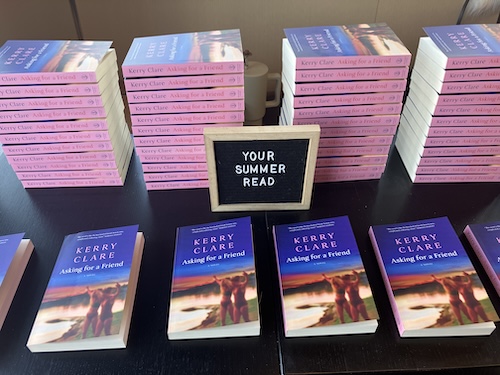
Wednesday night was ✨✨MAGIC✨✨ Thank you to The Gather Society for making ASKING FOR A FRIEND part of your beautiful event at The Daughter Wine Bar that was all about nurturing women’s connections. I had the pleasure of saying a few words at the mic and mentioned all the connections that would be sparked during the evening, and also the fascinating hidden ways in which many of us were connected already—and during my book signing I got to discover a few of these, like Danielle from @thechefupstairs whose charity online cooking class was one of the highs of the pandemic lows for our family, and @stephstwist who it turns out is my neighbour and is opening her bakery just minutes from my house! (Plus my best friend of 30+ years was in attendance!) A whole bunch of brand new connections were fostered last night as well, and everyone went home with a copy of Jess and Clara’s story, which is all about the way events of a single evening can stitch two lives together. Erin, Emily and ESPECIALLY Kirsten @perfectlyimperfectsocial (who elevates to an art form being a human on the internet and whose support of my novel has been such a gift), once again, you made something extraordinary happen. I’m in awe, and so grateful.
